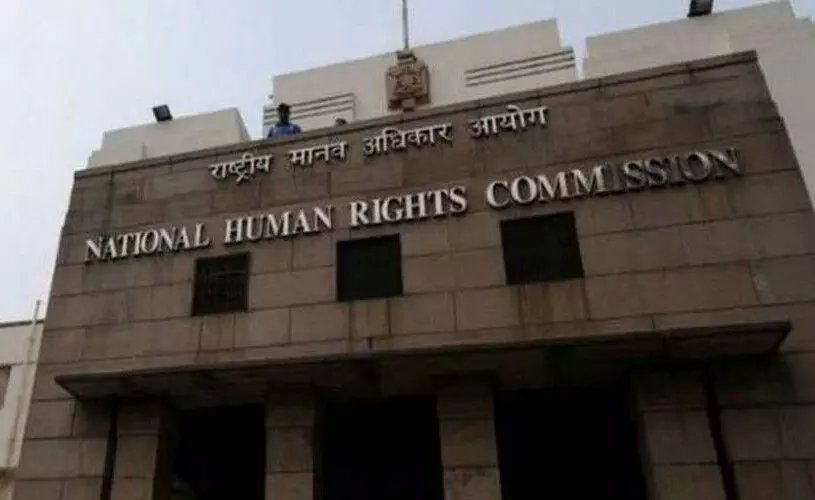NHRC recommends all states to have 'anti-human trafficking nodal officer
This officer should not be below the rank of a secretary to a state government or an inspector general of police, the NHRC said
By Newsmeter Network
Representational Image
New Delhi: The NHRC has recommended that every state should have an "anti-human trafficking nodal officer" who shall coordinate with the government authorities by taking effective steps and measures to curb this menace.
This officer should not be below the rank of a secretary to a state government or an inspector general of police, the National Human Rights Commission (NHRC) said in a statement on Friday.
The Commission's recommendations have come in the wake of its findings in a case registered suo motu in October 2022 based on a media report alleging that girls were being "sold on stamp paper in half a dozen districts" of Rajasthan and sent to Uttar Pradesh, Madhya Pradesh, Mumbai, Delhi and foreign countries and "subjected to physical abuse, torture and sexual assault in slavery", it said.
The Commission has also taken note of the plight of women dancers from Mumbai bars trafficked from Rajasthan and "forced into prostitution" as pointed out in the report of its Special Rapporteur, the rights panel said.
"Accordingly, it has directed the chief secretary and Director General of Police of Rajasthan to send a team, headed by an officer, not below the rank of Inspector General of Police, for an investigation to Mumbai to find out the plight of girls in dance bars," it said.
The Commission has asked the DGP, Maharashtra to extend help to Rajasthan Police in this regard to take effective steps to prevent such incidents and ensure their repatriation to their original places and the state and district level committees ensure their rehabilitation in accordance with the directions issued by it, the statement said.
The NHRC observed that given the registration of cases involving "selling of girls" in some communities in the recent past, it appears that the practice is still "continuing unabated" and "prevailing undeterred".
It said the practice requires to be curbed forthwith in totality and "stringent steps" be taken by all the stakeholders, the statement said.
The Commission had sought reports from the chief secretary and DGP, Rajasthan besides its Special Rapporteur in the matter in the past, it said.
The state government confirmed the incident and said that a charge sheet was filed against the 23 accused. The seven girls, who are victims of trafficking, have been rehabilitated in Nari Niketan Girl's Reform Home, Ajmer and Nati Niketan, Ajmer, respectively, it said.
From the report of the Special Rapporteur, the Commission noted that the selling of women on stamp papers is a "prevailing practice" in the male-dominated Kanjar community and the immoral practice of trafficking the girls is rampant in certain communities residing in various parts of Rajasthan. The young daughters and sisters have been "forced into the sex trade," the rights panel said.
Therefore, to stop this menace, the Commission has recommended all states must have an anti-human trafficking nodal officer, who shall coordinate with the government by taking effective steps and measures through the District Anti-Human Trafficking Units (DAHTU) and state government concerned, the statement said.
The Commission has also recommended that the DAHTUs, which were to be set up under a comprehensive scheme, as notified by the Union Home Ministry vide circulars earlier, should be headed by a gazetted officer, not below the rank of a deputy SP.
He should be effectively monitoring such incidents with the help of representatives from the departments of women and child welfare, health and family welfare, labour and employment, reputed local NGOs and experts in the field of human trafficking and legal counsellors in the district, it said.
Recommending various functions of the DAHTUs, including checking human trafficking and the rehabilitation of victims, the Commission has issued notices to the chief secretaries of all the states and Union Territories to submit reports on compliance within eight weeks, the statement said.
It is thus enjoined upon the state or UT governments to initiate all effective measures to prevent such practices from prevailing in some communities and to eradicate child prostitution but also for effective and adequate rehabilitation and reintegration of the "sexually ravaged minor girls" by integrating them with the society by providing adequate relief and rehabilitation available under various schemes of the states, it added.
The state or UT governments, through local staff government, as recommended by the Commission, are duty-bound to spread awareness about the constitutional prohibition preventing child prostitution and educate people about the selling of minor girls on stamp papers and their illegal marriage, to eradicate such practices, the statement said.
The Commission has also observed that despite stringent provisions in the law and the judgments of the Supreme Court and the Madhya Pradesh High Court in different cases having reference to human trafficking, it cannot be said that the desired result has been achieved, it said.
In this context, the Commission has noted in its proceedings the specific references from the Supreme Court orders in various cases, it said.
Inputs from PTI